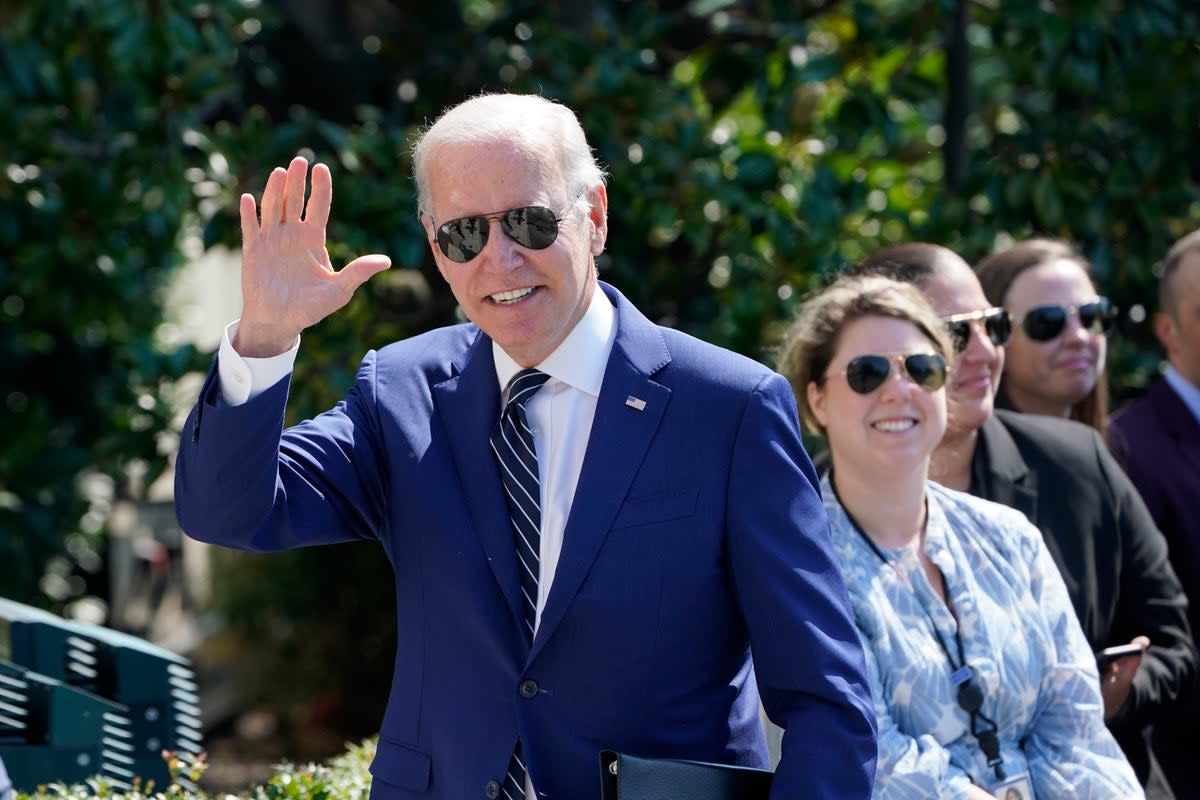Voices: How Biden stays friendly with Joe Manchin and Bernie Sanders at the same time

- Oops!Something went wrong.Please try again later.
- Oops!Something went wrong.Please try again later.
- Oops!Something went wrong.Please try again later.
- Oops!Something went wrong.Please try again later.
Way back in 2015, when I was a cub reporter, I went to an event at the Washington Hilton with a bunch of labor unions and environmental leaders. Coincidentally, it took place the day after Hillary Clinton had announced her candidacy, and two potential challengers were speaking that day: Senator Elizabeth Warren and then-vice president Joe Biden.
While Warren was clearly on friendly terrain, Biden faced some opposition. The Obama administration was promoting the Trans-Pacific Partnership, a free-trade agreement hated by both groups hosting the event. But Biden softened the audience up, saying it was important to “dance with the one who brung you” and talking about how both factions supported him early in his career. By the end of the speech, he had them eating out of the palm of his hand.
I’ve thought about that moment a ton recently, because it reminds me of the place where Biden is now as the leader of the Democratic Party.
That speech at the Washington Hilton was remarkable because, while Biden and the administration had no intention of backing down from the free trade deal, he was able to make the people gathered there feel that they were being heard. This is the modus operandi behind the run of good luck he’s enjoyed lately, and it’s testament to a simple formula for success: Even if no-one gets everything, everyone gets something.
Allow me to explain. Last year, Democrats were mostly split on how to get Biden’s agenda through Congress. Moderates wanted to pass the bipartisan infrastructure bill before Build Back Better, which would be put through the Senate on a simple party-line vote via the budget reconciliation process. Progressives wanted a hard guarantee that the infrastructure bill would only be passed once Build Back Better’s future was assured. That gap between the two positions led to many late nights on the Hill.
In late September, White House advisers met with Senators Joe Manchin and Kyrsten Sinema to try and get them to a “yes” on Build Back Better. That effort ultimately failed. Neither senator got to yes; if anything, the pressure likely repelled them further, particularly Sinema.
A few weeks later, Biden tried to get House Democrats to pass the bipartisan bill ahead of a trip to Europe, which didn’t happen. (The ensuing frustration is partially why moderate Democrat Stephanie Murphy of Florida called progressives “the Never-Enough Caucus”.) But a week later, after an hours-long huddle, the Congressional Progressive Caucus agreed to passing the infrastructure bill without Build Back Better after Biden and Pelosi made the hard sell.
Even though every member of the caucus except the Squad voted for the infrastructure package, it was clear the reconciliation bill was on life support until the two holdout senators could be brought on board. In the end, plenty of feelings were hurt when Manchin killed Build Back Better in December.
And yet, almost a year later, it seems like Biden and the Democratic leadership have figured out how to lead their members while making sure they don’t feel railroaded.
Senate Majority Leader Chuck Schumer kept his negotiations with Manchin private. And judging by the name of the bill – the Inflation Reduction Act – and its added provisions for lease sales for drilling, Schumer let his West Virginian colleague take the lead. When the act was finally passed, Manchin stood by Biden’s side as he signed it.
Conversely, as University of Denver professor Seth Masket tweeted, Biden’s announcement on student debt this week is clearly an olive branch to Senator Bernie Sanders. It’s a policy that Biden originally announced during the 2020 campaign, in order to reach out to primary voters who had backed Sanders and Warren.
Given the politics of today’s Democratic Party, and the Senate in particular, keeping both senators enthused is crucial, and it appears to be working. Sanders expressed his dissatisfaction with the pared-down IRA ahead of the vote for it, dragging out the process with amendments his party comrades refused to vote for, for fear of tanking the bill altogether. After that abrasive end to the year-long process, the student loan cancellation feels like a decent consolation prize, and Sanders has duly praised it.
Meanwhile, as our friends over at Punchbowl News reported a few weeks back, this move amounts to something of a reward for Warren’s willingness to play ball during the IRA negotiations. Back then, she and other advocates for aggressive climate action essentially told Schumer to take whatever deal he could with Manchin. (Schumer has championed canceling student debt as well, so he’s been given a prize too).
On top of this, Biden has covered his bases in the House too, satisfying House Majority Whip James Clyburn not only with the student debt announcement but with the confirmation of Ketanji Brown Jackson. It was Biden’s pledge to nominate a Black woman to the Supreme Court that earned him Clyburn’s endorsement ahead of the South Carolina primary, the state which propelled him toward the Democratic nomination.
Biden’s style isn’t failure-proof. Senate Democrats were furious at Sinema when she almost scuppered the whole IRA deal, and the House caucus will likely have a contentious time negotiating a police funding deal when they get back from recess. And the fun might well end when Republicans could still win back the House, the Senate, or both. But for now, Biden seems pleased to dance with every partner possible in the Democratic coalition – right up until the music stops.

